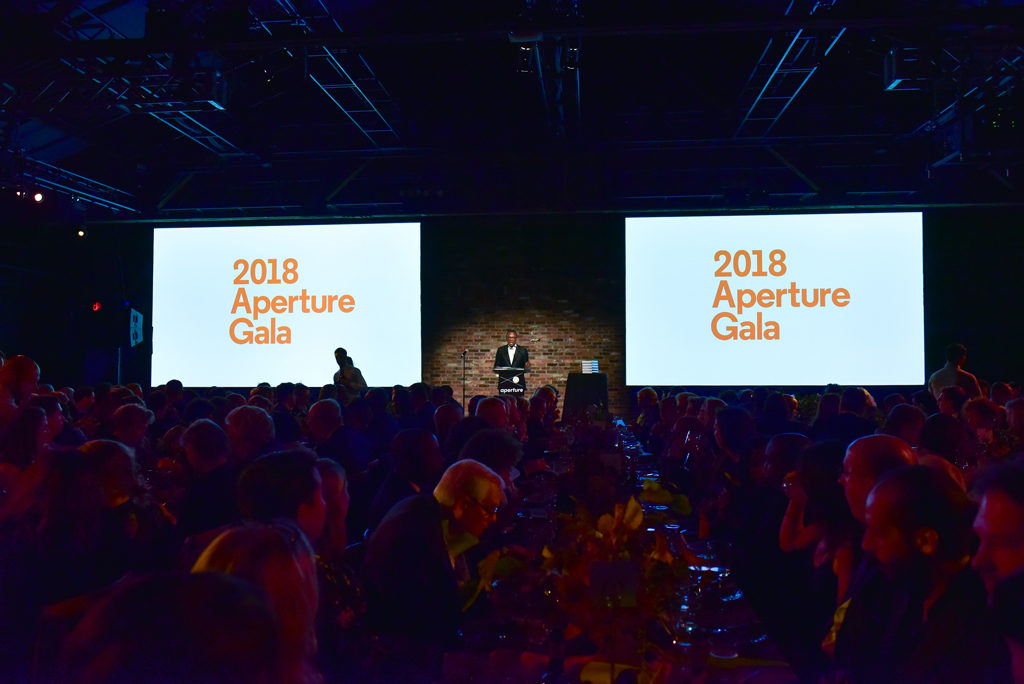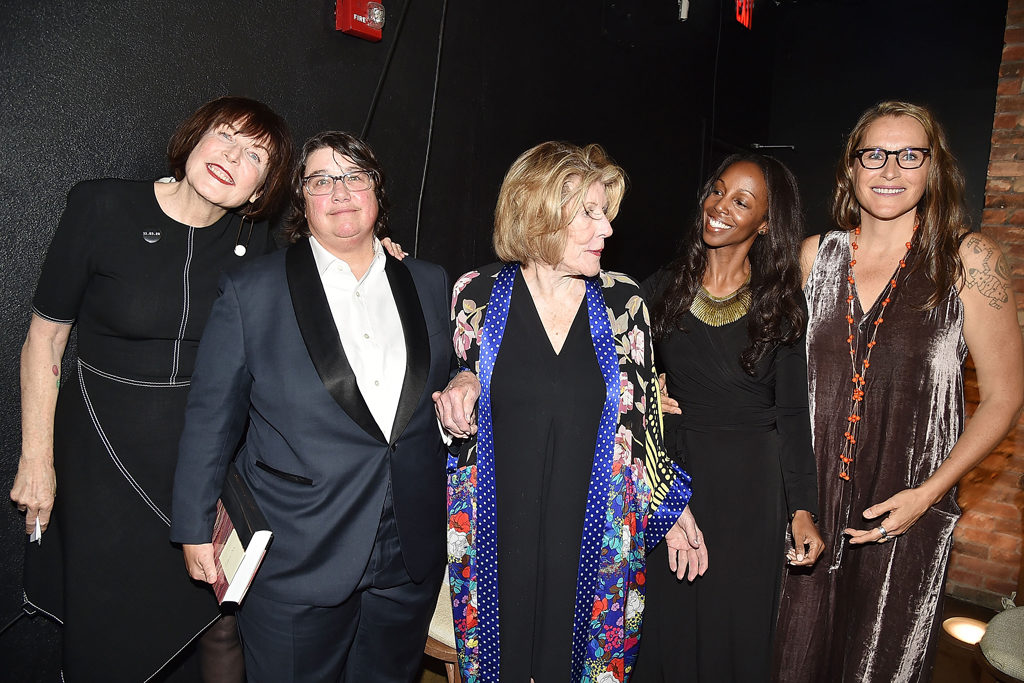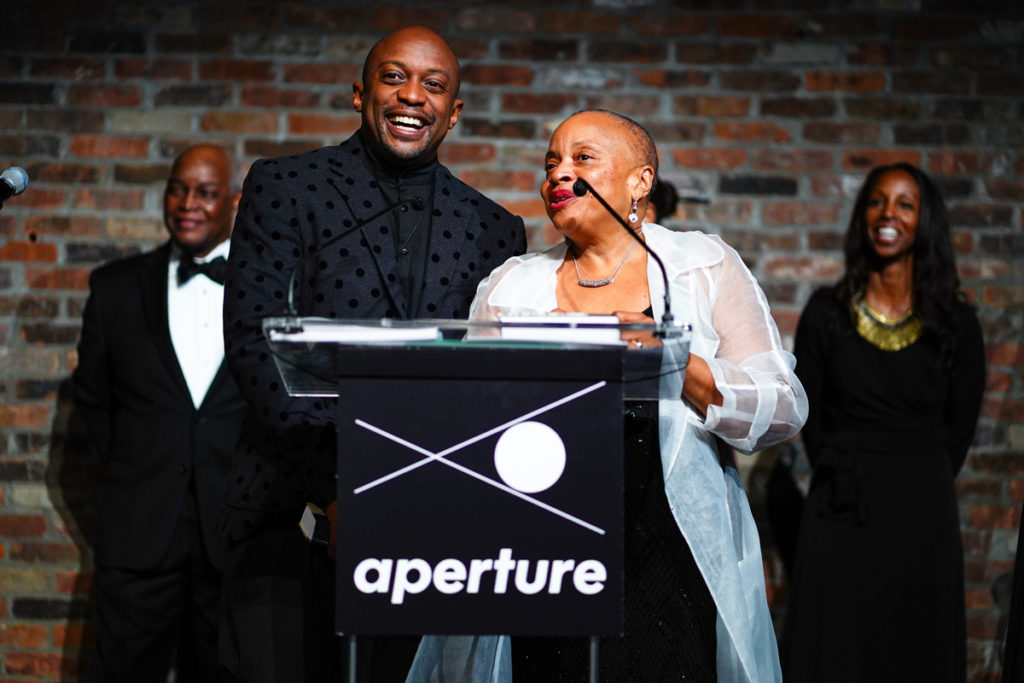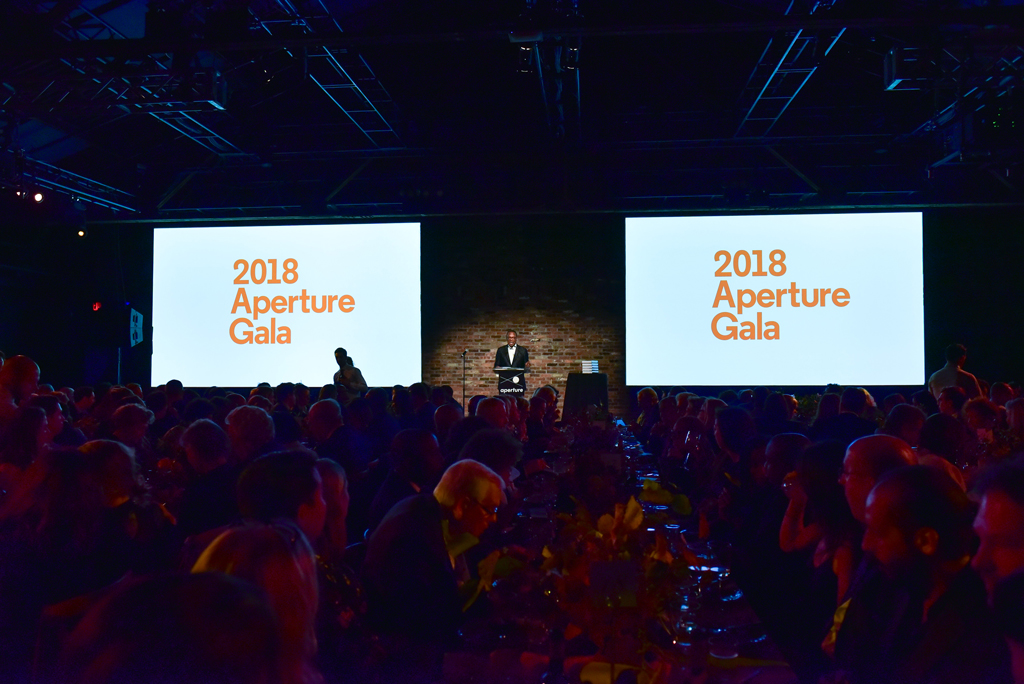[ad_1]

The fall 2018 Aperture Foundation gala.
SEAN ZANNI/PMC
Last week, during the Aperture Foundation’s fall gala at a cavernous space in New York’s Chelsea neighborhood, Marilyn Minter turned to Catherine Opie while the two artists stood onstage together, and said, “I wish you would adopt me.” Opie, not missing a beat, deadpanned back, “Can I swaddle you, then?”
As it happened, the evening’s theme was “Family,” and its honorees embodied that word in its many meanings: philanthropist and collector Agnes Gund and her daughter, documentarian Catherine Gund; scholar, curator, and artist Dr. Deborah Willis and her son, the photographer Hank Willis Thomas; and Opie, who’s been bringing visibility to queer families through her work for a few decades now.
But before any of them took to the stage, gala co-chair Sir Elton John delivered a message via video, stressing that photography—Aperture’s cause—has an “important role in creating a sense of belonging in our families, our communities, and our world.”
Chris Boot, the foundation’s director, echoed Sir Elton’s thought. “The idea of family,” he said, “as a singular source of love and strength in our lives, and in our work and the idea of photography, which we all use to articulate our connections to family, can help expand our vision of family and create visibility and respect for the new families that we make.”

From left, Marilyn Minter, Catherine Opie, Agnes Gund, Sarah Lewis, and Catherine Gund.
PATRICK MCMULLAN/PMC
The night’s emcee, financial adviser and collector Alvin Hall, championed all the awardees as “the real deal,” a phrase he said came from his childhood. He explained that it meant a person’s “commitments were sincere, that they interested genuinely in people, that they were passionate about the subject, that they meant what they said and that they treated others graciously.”
One might take that as a succinct summary of Opie’s practice, which has explored familial bonds through portrait photography in tones both optimistic and dark, whether showing herself breastfeeding her son or carving an image of a suburban unit into her back. When Opie spoke, she called everyone present her “family,” thanking Aperture, her communities, and the philanthropists in attendance, who “allow the next generation of image-makers to go on, and not only tell the truth through words but also . . . through what images do in this world.”
Art historian Sarah Lewis introduced the Gunds, saying that many in the room claim Agnes as “mother, sister, or aunt.” She pointed to the philanthropist’s recent sale of her prized Roy Lichtenstein painting to Steven A. Cohen as an example of her generosity for various communities. Of the $150 million she gained from the sale, $100 million went toward her Art for Justice Fund, which aims to end mass incarceration in the Untied States. “She’s shown us how important work in the arts can be for challenging our notion of who counts in this society,” Lewis said.
“Aggie, you represent the best in all of us,” she continued. “When others relax, you press onward. Both Aggie and Cat serve as reminders we should all do the best we can in this life with what we have and that there is no time to waste.”

Hank Willis Thomas and Deborah Willis.
SEAN ZANNI/PMC
Catherine, who spoke on behalf of her mother, said, “One of my thoughts to always live by comes from Toni Morrison, who said, ‘At some point in life, the world’s beauty becomes enough. You don’t need to photograph, to paint, or even to remember it. It is enough.’ And I feel like until that time comes, we have Aperture.” She added, “Some apples fall far away, but here we are to show that some apples fall right next to their tree.”
Carrie Mae Weems then staged a spoken word performance, backed by Craig Harris on a didgeridoo, to introduce mother-son honorees Deborah Willis and Hank Willis Thomas. Weems had the audience transfixed. She intoned: “You have opened the world with insight and information, leading us out of the darkness into light, always pushing, pushing, pushing, . . . answering, asking questions that few others dare to ask.” Lewis returned to the stage, joined by journalist Pamela Newkirk, and began listing the ways in which the two had helped to expand the breadth of photography, Deborah through her numerous writings, and Hank through his multifaceted artistic practice.
Kathy Sledge, lead vocalist of Sister Sledge, closed out the evening by singing some of the group’s biggest hits. She finished with a moving and celebratory rendition of “We Are Family,” as members of the legendary House of Xtravaganza and other attendees joined Sledge onstage to dance, connecting everyone as one big, happy family.
[ad_2]
Source link

